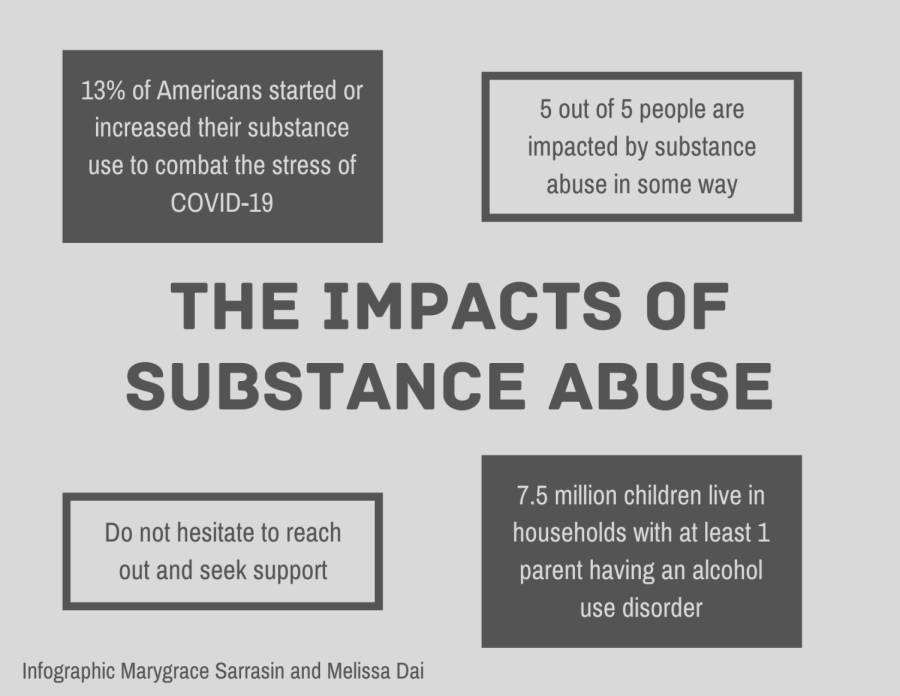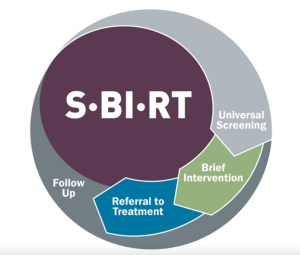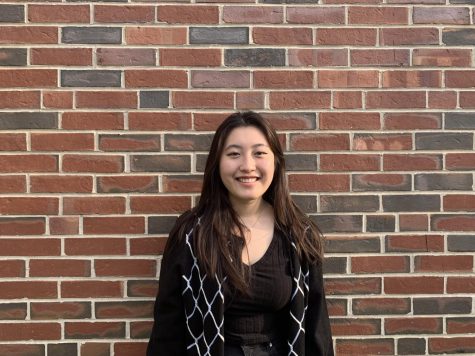Community provides support for students impacted by substance abuse
Graphic Marygrace Sarrasin and Melissa Dai
Substance abuse is prevalent in society today, and COVID-19 has only exacerbated the issue.
March 15, 2022
As mental health challenges and use of substances have increased during the pandemic, resources inside and outside of Algonquin are available for student support.
According to the American Psychological Association, in March 2021, 13% of Americans reported starting or increasing substance use as a way of coping with stress due to COVID-19.
“There’s definitely been a pretty significant increase in substance use and mental health challenges during the pandemic,” Executive Director of Shrewsbury Youth and Family Services Christine Mowry said.
Mowry finds that one reason for this increase is unemployment.
“One of the problems that has arisen from [people collecting unemployment compensation] is that people who had substance use disorders or were starting to use substances got a whole bunch of money and then had access to substances,” Mowry said.
According to the Substance Abuse and Mental Health Service Administration (SAMHSA), in 2017, about 10.5% (7.5 million) of children lived in households with at least one parent who had an alcohol use disorder.
“We always say one of five people are impacted [by substance abuse] or one in three people are impacted,” Mowry said. “But, in fact, five of five are impacted because everyone knows somebody, loves somebody, cares about somebody or is somebody who’s struggling with substances.”
According to the American Addiction Centers, children of addiction are at a higher risk of parental neglect, poor performance in school, developing anxiety or depression, physical/verbal/sexual abuse and earlier onset of experimentation with drugs or alcohol. Algonquin’s health curriculum helps students learn about risk factors and how to handle stress and other challenges in healthy ways.
“Substance use can lead to a lifelong pattern of addiction and mental health challenges,“ adjustment counselor Amanda Davidson said via email. “Together, these can really negatively impact a person’s future. Learning about risk factors and healthy coping strategies are important for young people to learn so they can lead functional and successful lives.”
According to Drug Rehab, some influences for teen use could be academic pressure, greater access or self-medication.
“If you look at behavior like an iceberg, all we can see is above the water line, so you really need to look underneath,” Mowry said. “Why is somebody using a substance? Are they struggling with depression? Are they self-medicating?”
Resources and people available to contact at school include guidance counselors, adjustment counselors, nurses or even teachers.
“The counselors are a tremendous resource/support for any social-emotional and substance issues,” Director of Guidance Lisa Connery said via email. “The counselors are trained to support students in all of these areas.”
Guidance counselors are there to help students not only regarding their academic needs, but also their emotional and social needs.
“Sometimes students express concerns that seeking out support from their guidance counselor will impact their college admissions process,” Connery said. “It’s so important for students to know that this is not the case at all. The two issues are completely separate. Students should feel comfortable seeking out help for themselves and/or a friend.”
In 2020, many teachers took part in a six-hour certification program run by SYFS to train in mental health first-aid.
“We spend a significant amount of time talking about the more common mental health or substance use challenges we see in adolescents,” Mowry said. “How do I identify them? When is it time to recognize that this is not normal adolescent behavior and then how to support a young person and to access support and resources?”
Outside sources such as Northborough Youth and Family Services and Wayside Youth and Family Services provide counseling and crisis services. For immediate help, 24-hour hotlines such as the Crisis Text Line (Text HOME to 741741) or the National Suicide Prevention Lifeline (800-273-8255) are available.













